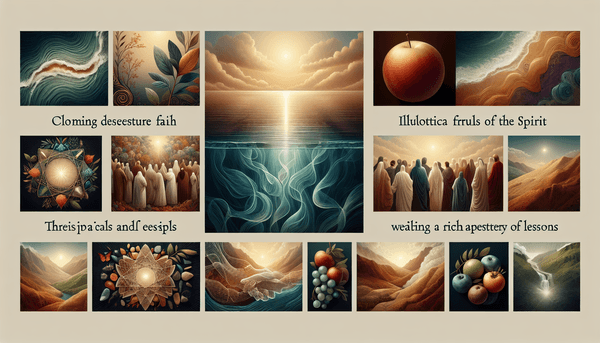Understanding Faith through Romans
At the heart of the apostle Paul's letter to the Romans is the concept of faith. Faith, as described in Hebrews 11:1, is 'the assurance of things hoped for, the conviction of things not seen.' This belief and trust in God's promises serve as the bedrock for the Christian life. Paul eloquently states in Romans 10:17 that 'Faith comes from hearing, and hearing through the word of Christ,' highlighting the importance of engaging with Scripture to grow in faith. To cultivate a strong faith, one must immerse oneself in the Bible, spend time in prayer, and actively participate in a community of believers. Such practices develop a faith that is alive and evidenced by works, as James 2:17-18 reminds us that faith without deeds is dead. As we walk by faith and not by sight (2 Corinthians 5:7), we are called to embody the principles of love, forgiveness, and compassion, trusting in the grace and righteousness that come through faith in Jesus Christ.
The Human Condition and Divine Justice in Job
The book of Job confronts the reality of suffering and the search for understanding in the midst of pain. In Job 7, we find Job in the depths of despair as he questions the purpose of his suffering, echoing the sentiment that 'human life is but a breath' (Job 7:7). His friend Bildad, in Job 8, presents a contrasting view, suggesting that Job's suffering is a result of unrighteousness and that restoration comes through seeking God and living with integrity (Job 8:5-6). This discourse reflects the broader struggle to reconcile human experience with the notion of divine justice. The conversations between Job and his friends delve into the profound issues of life, suffering, and faith, ultimately pointing to the need for wisdom and trust in God, who 'saves the crushed in spirit' (Psalm 34:18), even when His ways are beyond our understanding (Proverbs 3:5). In this context, the resurrection of Jesus offers a transformative perspective on suffering and divine justice, one that has echoed through the ages and continues to offer hope and redemption.
Conclusion
Through our exploration of the book of Romans and the discourse of Job, we have delved into the depths of faith, the manifestation of the Spirit's fruits, and the complex interplay of suffering and divine justice. These biblical texts offer rich insights that speak to the core of our spiritual journey. They challenge us to grow in faith, to allow the Holy Spirit to transform our lives, and to seek understanding and comfort in the midst of trials. As we continue to engage with the wisdom of the Scriptures, may we be encouraged and equipped to navigate the intricacies of life with a steadfast trust in God's sovereign plan and an unwavering commitment to walk in the way of Christ. For further reflection on the profound truths of Scripture, consider exploring the depths of God's grace and the richness of Jesus' love.
FAQ
Q: What is faith?
A: Faith is a strong belief or trust in something or someone, often without tangible evidence. It is often associated with religious or spiritual beliefs but can also refer to trust in a person, an idea, or a higher power. Faith can provide a sense of hope, comfort, and guidance in times of uncertainty or difficulty.
Q: Which fruits correspond to the Fruits of the Spirit?
A: The fruits of the Spirit are love, joy, peace, patience, kindness, goodness, faithfulness, gentleness, and self-control. These are qualities produced in the lives of believers by the Holy Spirit, as detailed in Galatians 5:22-23.
Q: What body part was Eve created from in the story of Adam?
A: According to the Bible, Eve was created from one of Adam's ribs. Genesis 2:21-22 describes the process of God making a woman from the rib taken out of the man and bringing her to him.
Q: What does 'Faith comes from hearing, and hearing through the word of Christ' mean?
A: This verse from Romans 10:17 highlights the importance of engaging with the teachings of the Bible to foster faith. It suggests that faith grows as we listen to and internalize the message of the Gospel of Christ.






